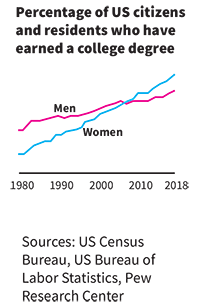GUEST EDITORIAL
By Empowering Women, We Improve the Lives of Everyone
By Charo Uceda

Charo Uceda
In March 2018, the Pew Research Center published a set of promising yet discouraging statistics concerning gender equality: Over the past half-century, women had strengthened their position in the U.S. labor market with higher wages, yet their leadership roles at top levels of government and business were still lagging. The Pew researchers found the following:
• Women comprise 47% of today’s U.S. labor force, up from 30% in 1950.
• Women have seen steady growth in labor force participation over the past several decades. In 2017, 57% of women 16 years and older were either employed or looking for employment; in 1980, the percentage was at 51%
• Growing wages for women have narrowed the gender pay gap, however, women still earn less. Women’s median hourly earnings were $16.00 in 2016, up from $12.48 in 1980, while men earned $19.23 in 2006, down slightly from $19.42 in 1980
 • In educational attainment, women have made gains which has contributed to progress in the work force at large. Women are now more likely than men to have a college degree.
• In educational attainment, women have made gains which has contributed to progress in the work force at large. Women are now more likely than men to have a college degree.
• In business and government, women still lag in top leadership positions although there was a recent jump to 23% of women in the most current US Congressional period session from the 19% in 2013–2015. However, women continue woefully underrepresented as only 6.6% of Fortune 500 company CEOs are female.
These preliminary figures show that women continue to experience gains toward equality, but workingwomen are more likely to face gender discrimination. Forty-two percent of women claim they experience it, against 22% of men. It also indicates that the public seems to be divided on whether we have made adequate progress.
Since there are always two sides to every coin, it is important to mention that the National Domestic Violence Hotline posts that nearly three in 10 women (29%) have experienced rape and or physical violence. A report from the U.S. Census Bureau reveals that 62% of new mothers in their early 20s are unmarried, while the U.S. Census found that 36% of all mothers were unwed in 2011, up from 31% in 2005. In families with incomes of less than $10,000, that number goes up to 69%. Single mothers are one of the most disadvantaged groups in the U.S.—nearly 30% of their families live under the poverty line.
However, if we take a worldwide look at the treatment of women, the situation is much more dire. In the 21st Century, we still see millions of women who suffer abuse and the resulting lack of opportunities show that they are not able to exercise their full rights of citizenship in the countries in which they are born. Millions of women are denied basic rights to freedom and access to education, resulting in zero participation in carving their own futures and condemning members of their communities to continue to endure poverty, health crises, and isolation, both for them and their children.
Gender equity and equality are vast and complex topics, and we need to become empowered to improve the lives of disadvantaged women throughout the world. Remember, statistics are only good if they are the basis for action plans! #
Charo Uceda is the founder and CEO of Uceda Schools and has started the Charo Uceda Women’s Empowerment Lecture Series at Teachers College, Columbia University. Charo earned graduate degrees at both Harvard and Columbia.
